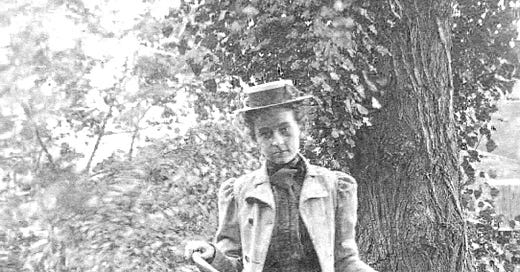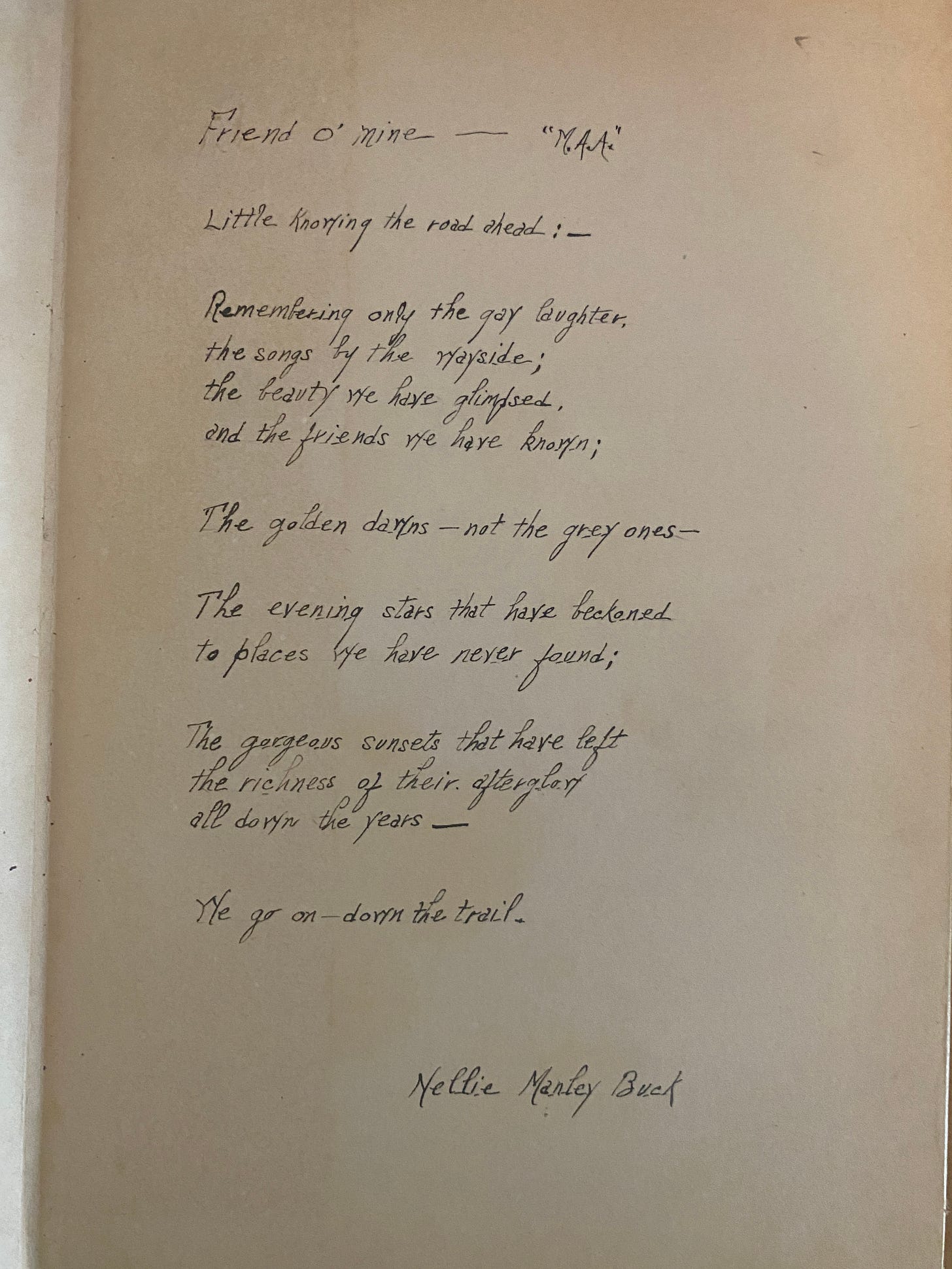Songs by the Wayside, Poems By Winding Trails
An introduction to the poetry of Nellie Manley Buck.
Since it's national poetry month I thought I would follow up my last post about Nellie Manley Buck with a brief introduction to her poetry.
In addition to her work as a newspaper editor and columnist for the Itasca Iron News she published a book of poetry in 1928 called By Winding Trails. I managed to get a hold of the only copy I could find on the internet.
This copy was even signed by the author and inscribed with a poem not in the book.
The book mostly consists of idylls and nostalgic glimpses at her experiences growing up in Eau Claire, Wisconsin. Many of which reflect on the adults in her life trying to throttle her tomboy tendencies. Her personality that comes through the poetry fits perfectly with the version of her I had in my mind based on this photo I found on Ancestry.
There are also some reflections on the changing times in the 1920s such as the scandal of bobbed haircuts and the paving of roads. Some are brief vignettes and some are longer narrative poems.
After publishing her book she continued to write poetry and publish it in the newspaper where she worked. Some of the poems were also picked up by other papers in the region and at least as far away as Oklahoma. These poems were often timely and reflected on World War II, survivors of World War I and small town life. Some had a satirical tone, and some sentimental.
Her poems were also published in anthologies of poets from Minnesota, the journal “The Country Bard” and a newspaper trade publication “The Publishers’ Auxiliary.” There are probably more but those are all that I’ve found up to this point. She was also a member of the National League of American Pen Women, an organization I’m embarrassed to admit I had never heard before researching Nellie.
I’ll share plenty more of her poetry in the future. However, there’s one poem from the book which really stood out to me. It’s relevant not only to her story but to the stories of many of the folks whose letters are included in Dear Mister Ward. Not to mention the story of some of my own Midwestern ancestors.
The book isn’t in the best shape so I’ve transcribed it rather than posting a photo. I recommend reading it on a screen larger than a phone if possible as the lines are rather long and get broken up on a small screen.
That Northern Home of Mine
There's red clover along every road-side,
Golden grain fields, wave on wave, like the tide,
Wind-tossed flax, where the fairies keep tryst,—
Their blue eyes laugh through the shimmering mist,
In that northern home of mine.
Those fields have been cleared these many years,—
Great toilers were those old pioneers.
Their graves are sunk where the pine groves keep
Whispering watch where the workers sleep,
In that northern home of mine.
Not all that country is under the plow;
The timber has been there through time until now;—
Great woods and stretches of bottomless swamp,
Where the night fog hangs heavy and cold and damp,
In that northern home of mine.
'Twas Swede and Norse and the silent Finn
Who came to break that new land in;
With a little sprinkling of eastern folk,
And men of old Iowa prairie stock,—
In that northern home of mine,—
Who mingled their blood in a race of men
That shall win 'til the pine groves call each name,
And they leave a brood that again shall stand,-
The stalwart tillers and owners of land,—
In that northern home of mine!
Many the lakes, in that old northern land,
Where wild game drink. On the white beach sand,
How oft I have lain in the heat of noon,
Or shivered at eve, when call of a loon,
In that northern home of mine,
Has startled the birds, asleep in their nest.
O life, send me back there, some day to rest.
May the pine groves whisper their requiem mass,
and bring me peace,—when my spirit shall pass
To that northern home of mine!Aside from the erasure of Native Americans indicative of the time I thought it was a nice tribute to the “pioneers” who Aaron Montgomery Ward built his company to serve. While my grandma’s parents settled directly in St Paul and lived an urban existence, my grandpa’s mother’s family were Finnish immigrants who settled in rural Michigan at the end of the 19th century. However, I can’t say that had a reputation for being silent. My grandpa’s dad’s family were very much of the “sprinkling of Eastern folk” who settled in Wisconsin in the 1840s.
Get a signed copy of the first edition of Dear Mister Ward before they’re gone forever.
They make a great mother’s day gift and I’m happy to sign and include a custom message.
Also, check out the new feature on the Substack app called Notes. I’ll be posting tidbits from my research that either don’t warrant a full post or that will act as a preview of posts to come. For more info check out this post:








